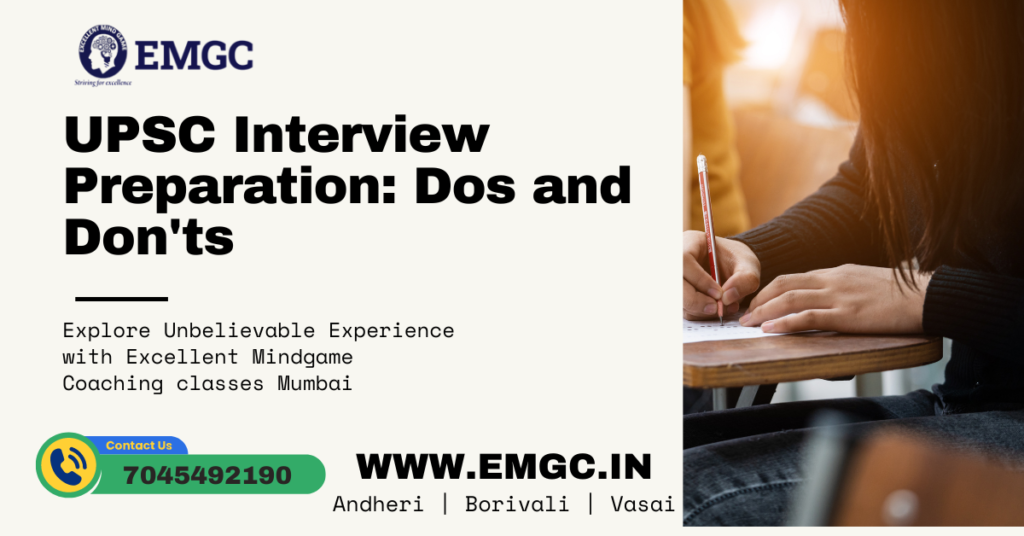
UPSC Interview Preparation: Dos and Don’ts
Introduction to UPSC Interview
The UPSC (Union Public Service Commission) interview, also known as the Personality Test, is the final stage of the Civil Services Examination. It is a crucial step in the selection process, where candidates are evaluated not only on their knowledge but also on their personality traits, communication skills, and overall demeanor. Aspirants must approach the UPSC interview with meticulous preparation and strategic dos and don’ts to maximize their chances of success.
Dos for UPSC Interview Preparation
1. Thorough Understanding of DAF
The Detailed Application Form (DAF) serves as the blueprint of your personality during the interview. Dos include understanding every aspect mentioned in the DAF, such as educational background, hobbies, work experience, and personal interests, to confidently answer questions related to these areas.
2. Current Affairs Awareness
Stay abreast of current affairs, national and international events, government policies, and socio-economic issues. Dos entail reading newspapers, magazines, and reliable online sources regularly to develop a holistic understanding of contemporary issues and articulate informed opinions during the interview.
3. Mock Interviews
Participate in mock interviews conducted by experienced mentors or coaching institutes to simulate the actual interview environment. Dos involve practicing responses to anticipated questions, refining body language, and receiving constructive feedback to improve performance and boost confidence.
4. Clarity of Thought and Expression
Dos encompass cultivating clarity of thought and expression to articulate answers concisely and effectively. Practice structuring responses logically, maintaining coherence, and avoiding ambiguity to convey ideas convincingly to the interview panel.
5. Positive Body Language
Project confidence, enthusiasm, and professionalism through positive body language. Dos include maintaining eye contact, sitting upright, gesturing naturally, and exhibiting a pleasant demeanor to create a favorable impression on the interviewers.
Don’ts for UPSC Interview Preparation
1. Rote Learning
Avoid rote memorization of facts and figures without understanding the underlying concepts. Don’ts entail focusing solely on memorization, as it may hinder the ability to analyze situations critically and provide thoughtful responses during the interview.
2. Overconfidence
While confidence is essential, overconfidence can be detrimental. Don’ts involve refraining from arrogance or complacency during the interview. Maintain humility, acknowledge areas of improvement, and demonstrate receptiveness to feedback from the interview panel.
3. Neglecting Ethics and Integrity
UPSC places significant emphasis on ethical values and integrity. Don’ts include compromising ethical principles or providing misleading information during the interview. Uphold honesty, integrity, and ethical conduct throughout the interaction.
4. Underestimating Communication Skills
Effective communication is key to conveying ideas persuasively and engaging the interview panel. Don’ts entail underestimating the importance of communication skills. Avoid using jargon or convoluted language; instead, strive for clarity, coherence, and eloquence in speech.
5. Succumbing to Stress
Interview nerves are natural, but succumbing to stress can impair performance. Don’ts involve letting anxiety overshadow preparation efforts. Practice relaxation techniques, maintain a positive mindset, and approach the interview with confidence and composure.
Conclusion
Preparing for the UPSC interview requires a comprehensive approach encompassing thorough understanding, current affairs awareness, mock interviews, clarity of expression, and positive body language. By adhering to strategic dos and avoiding common pitfalls, aspirants can navigate the interview process with confidence, poise, and professionalism, ultimately increasing their chances of success in achieving their civil services aspirations.
